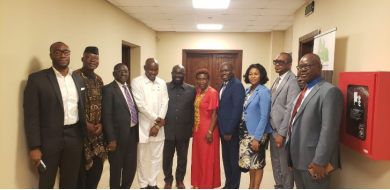Commentary: His Honor Chief Justice Gbeisay is Wrong

By Seltue Robert Karweaye Sr.
Liberia’s Chief Justice Yarmie Quiqui Gbeisay responded to accusations of nepotism on Friday, firmly defending both his and President Joseph Nyuma Boakai’s decisions regarding the appointment of his son as an associate magistrate. Notably, his son is currently a third-year law student, which has raised concerns among critics.
In his defense, Chief Justice Gbeisay explained, “The President of Liberia possesses the legal authority to appoint individuals to the role of associate magistrate. My son is a proud Liberian, currently pursuing his legal education, and the president made this appointment in good faith, adhering to his constitutional duties. I find no issue with this decision. If anyone can provide me with a specific law that prevents the president from appointing a non-lawyer to the position of associate magistrate, I would be willing to resign from my position immediately.”
His remarks were made in response to a strongly worded letter issued by the National Association of Trial Judges of Liberia (NATJL), headed by Judge Nancy F. Sammy. The letter cautioned President Boakai that circumventing the established training pipeline offered by the Judicial Institute for prospective magistrates undermines the integrity of the legal system and poses a significant risk of politicizing the judiciary, particularly at the lower levels. This situation has prompted a broader dialogue about the qualifications required for judicial appointments and the potential implications for the rule of law in Liberia.
Chief Justice Yormie Gbeisay’s defense of his decision to recommend his son’s appointment by the President is deeply troubling and unacceptable. This action reflects an alarming attempt to normalize nepotism within Liberia’s judicial system, which should be founded on principles of fairness, integrity, and independence. The Code of Conduct that governs public officials is explicit regarding this matter:
– **Section 1.3.12** clearly prohibits public officials from leveraging their positions to grant preferential treatment to relatives or allowing personal interests to interfere with their responsibilities to the public.
– **Section 9.7** explicitly forbids public officials from recommending or influencing the appointment of family members in institutions over which they exercise official oversight.
The President must bear equal responsibility for this troubling situation. By appointing his own relatives to sensitive and influential government positions, and by failing to reject the Chief Justice’s questionable recommendation, he is effectively institutionalizing nepotism within the government. This practice not only contradicts the very spirit of the Code of Conduct but also perpetuates the entrenched, corrupt practices that have historically impeded the fight against graft and undermined democratic governance in Liberia.
The implications of these actions are profound; they set a dangerous precedent that threatens the rule of law and the public’s trust in a fair judicial process. Without immediate corrective measures, the principles of justice and equality before the law may be irrevocably compromised, paving the way for continued corruption and favoritism in public service.
Liberians have experienced the detrimental effects of nepotism firsthand throughout their history. The regime of William Richard Tolbert was notorious for promoting nepotism and partisanship, which eroded public trust and impaired effective governance. Similarly, under Ellen Johnson Sirleaf’s leadership, the increased prevalence of family appointments significantly undermined the moral authority of her administration and compromised her government’s initiatives to combat corruption. This alarming trend should have served as a cautionary tale rather than a model to imitate. Public office ought to be viewed as a position of responsibility rather than a family heirloom, and no amount of legal maneuvering can legitimize such a blatant abuse of authority.
Chief Justice Yarmie Quiqui Gbeisay must confront the reality that the practice of nepotism severely compromises the efficiency of state governance and violates the fundamental principles of social justice and fairness. When favoritism dictates public appointments, it skews the competitive landscape, creating an environment ripe for inefficiencies and unequal opportunities. This destructive practice not only suppresses the aspirations and potential of deserving individuals but also hampers overall economic growth and development within society, stalling progress and innovation.
Furthermore, the implications of nepotism extend well beyond administrative inefficiencies; they can deeply erode the moral fabric of society itself. By cultivating a culture of entitlement and favoritism, nepotism detracts from the values of competence, accountability, and transparency, which are essential for creating a just and equitable society. It fosters a system in which personal connections take precedence over qualifications, ultimately undermining public trust in governmental and judicial institutions.
In endorsing his son’s appointment, Chief Justice Gbeisay has categorically violated Section 1.3.12 and Section 9.7 of the Code of Conduct, which exist to uphold ethical standards and preserve the integrity of the judiciary. His actions not only jeopardize the fundamental independence of the judicial system but also significantly erode public confidence in its capacity to deliver impartial and fair justice. The public’s trust in the judiciary is vital for the functioning of a healthy democracy, and such breaches of ethical conduct can have far-reaching consequences on the public’s perception of justice, fundamentally altering the relationship between citizens and their institutions.



















